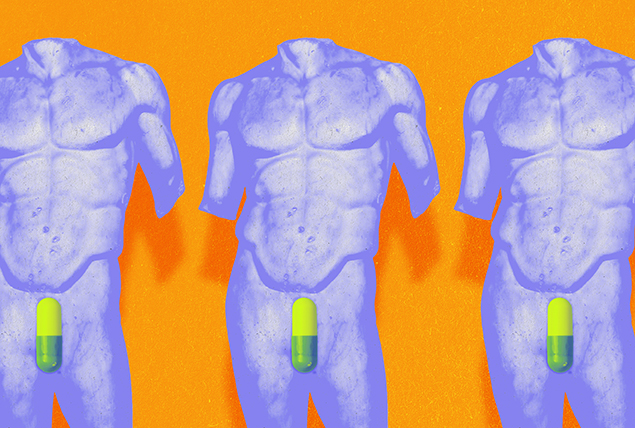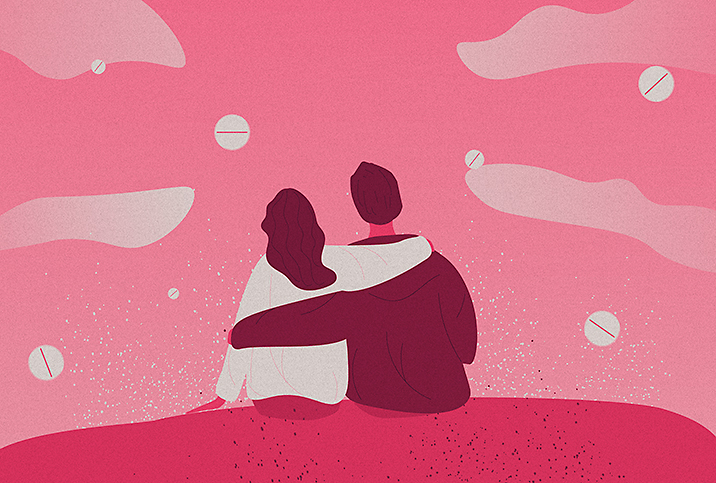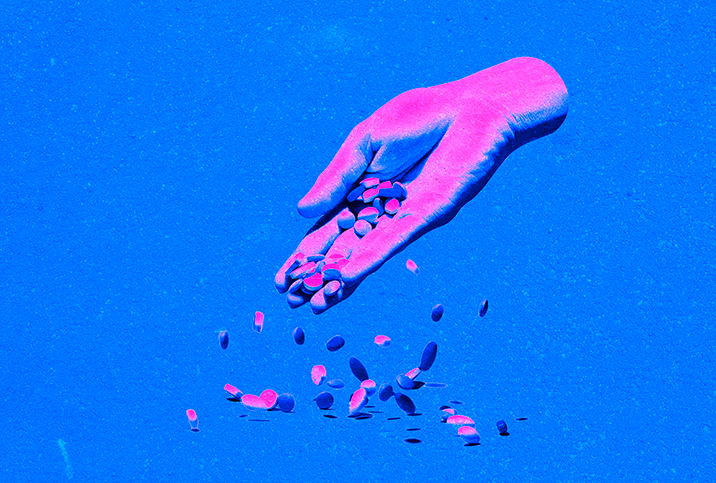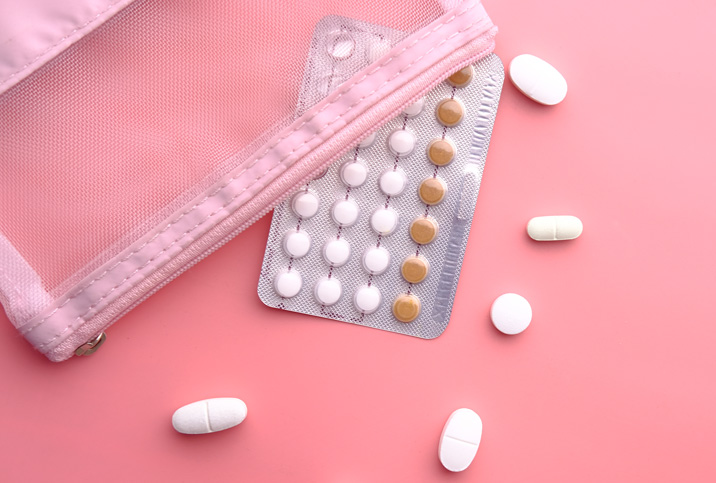How Might Antidepressants Impact My Sexual Health?

Taking care of your mental health is imperative, and if antidepressants are part of the program, they should be taken as prescribed. They are beneficial to millions of American men, but they might also lead to an unwelcome side effect: sexual dysfunction.
Potentially, antidepressants can impact sexual health in all aspects: libido, erectile function, ejaculation and orgasm. A common type of drug offender is selective serotonin reuptake inhibitors (SSRIs), a class of antidepressants that includes Prozac, Zoloft and Lexapro, among others.
What do SSRIs do?
SSRIs work by increasing the amount of serotonin in the brain to fight the symptoms of depression. However, serotonin levels can affect other hormones, such as dopamine, testosterone and estrogen, which play roles in sexual function, according to Raevti Bole, M.D., a urologist and male infertility and andrology fellow at Cleveland Clinic.
"Not everyone experiences bothersome sexual side effects from antidepressants," Bole said. "But if you do notice sexual issues that started after getting on medication, it's important to talk to your prescribing psychiatrist."
SSRIs can lead to "decreased sexual urge, decreased ability to have an orgasm, decreased ability to maintain an erection and decreased ability to develop an erection," said Tom Xia, M.D., a psychiatrist and the medical director of the Clinic in San Francisco.
"All these areas can be impacted by medications, but that's not to say all of them will be impacted," Xia said. "It's really hard to predict which of these areas will be impacted. You really have to assess how the patient is responding to the medication."
Depression can lead to sexual dysfunction, too, so the question sometimes becomes whether the cause is the medication or the depression itself.
When Xia first sees a man with depression who isn't on any medication yet, he can be sure any sexual dysfunction at that point is not medication-related.
"Sometimes patients will notice improvement of sexual side effects with starting a medication," Xia said. "That's just because you're really treating the depression side of the symptoms."
Data shows that people who are depressed have a 50 percent greater chance of sexual dysfunction than the general population, according to Sara DeLong, M.D., a psychiatrist at Perspective Mental Health in Salt Lake City.
"The general population is around 25 percent, in which case you're better off treating your mood disorder," DeLong said. "And oftentimes, that actually leads to improvement in your intimate life, which is ironic given the fact that some of the medications that we use do indeed have sexual side effects."
DeLong warns her male patients about the potential sexual side effects of antidepressants because she knows they're not going to spontaneously bring it up to her.
"I will say the biggest deal-breaker side effects of the SSRIs are decreased libido or sex drive, delayed orgasm, decreased intensity of orgasm or, in a minority of cases, no longer experiencing orgasm," she said.
Managing sexual side effects of SSRIs
If a patient is experiencing sexual side effects from medication, DeLong may try switching to another antidepressant. Some newer-generation antidepressants, such as Trintellix (generic name: vortioxetine) and Viibryd (vilazodone), have lower rates of sexual side effects.
Xia said there are also certain medications that either reverse or limit the number of sexual side effects. Two common ones are BuSpar (buspirone) and Wellbutrin (bupropion).
"These are adjunctive depression and anxiety medications that can oftentimes decrease the sexual side effects," Xia said, adding that about one-third of his patients report sexual side effects from antidepressants. "I would say less than 5 percent of my patients are reporting significant sexual side effects to the point where they're concerned and we need to either change the medication or add something else on board."
DeLong pointed out that the sexual side effects tend to be dose-dependent.
"My general strategy is to start low and go slow," she said. "Lowering the dose is one option."
However, this must be approached on an individual basis and depends on the severity of the illness. If the patient's depression is severe to the point that they need to be on high doses, decreasing the dose may not be an option because it's going to worsen the depression.
"There are definitely cases where patients have been stable on medication for a long time and it may be time to discuss whether it's appropriate to decrease the dose," Xia said. "Many patients can come off medications and do really well. It's really on a case-by-case basis that you can decide that. We do expect that as you decrease a dose, there should be improvement with the sexual side effects."
Another potential option is taking a "drug holiday," when the patient stops taking the antidepressant for a planned period of time.
"You can skip the medication up to once a week without it impacting its effect on mental health," DeLong said. "Let's say you're having date night Wednesday. You skip whatever dose it is before that to see if that helps."
However, DeLong noted anecdotally that she has not seen patients have much success with this approach.
"Give it a try; it won't hurt anything," she said. "But I've had zero patients come back and say, 'Hey, that totally worked.' It didn't address the sexual dysfunction."
Be open with your doctor
Bole said it's important for urologists and sexual health providers to have a good working relationship with colleagues who specialize in mental health. For instance, in the case of a man with low libido, Bole checks for medical conditions that could be contributing to his low sexual desire.
"But I also always ask about other factors that affect libido, including sleep, stress level, relationship factors and mood," Bole said. "If it sounds like they have undiagnosed depression or need to see their regular mental health provider, I'll ask the patient if it's OK for me to facilitate a visit."
Psychiatrists should be comfortable talking with men about sexual function because the sexual side effects from antidepressants are so common, DeLong said.
"Don't be shy about bringing up any concerns," she said. "There are treatment alternatives if [an antidepressant] is bothersome for you."
Of course, some men are embarrassed to talk to their doctor about sexual issues, so Xia often finds he is the one initiating these conversations. Men tend to become more comfortable answering questions about it once he brings it up.
"I recommend speaking with your doctor and really evaluating the risks and benefits of being on this medication," Xia said. "It's really about evaluating the pros and cons and really deciding on a plan going forward."
It's not always easy for men to seek help, especially for something as personal and sensitive as mental health issues and sexual dysfunction. Plus, a lot of them don't have a therapist they see regularly, making that first step difficult.
Video visits have become a viable option for most people, and more physicians and therapists have added them as a service. They're a good way to see a doctor quickly, as many offer same-day appointments. Then, if follow-up is required, you have your foot in the door.
Giddy Telehealth makes it easy to get connected to a qualified healthcare professional who can help with a variety of conditions, including mental health and erectile dysfunction.


















